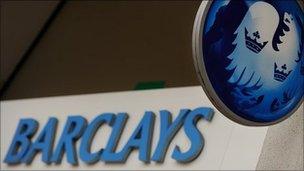Barclays: PPI complaints 'to keep rising'
- Published

Barclays was one of the first to say it would settle PPI complaints
Barclays Bank is expecting complaints about loan insurance to continue rising after a 93% increase in the first half of the year.
The High Street bank said complaints about payment protection insurance (PPI) had soared after banks lost their legal challenge on PPI rules in April.
It received over 73,000 insurance complaints, mostly about PPI, up from 38,000 in the same period of 2010.
Overall, Barclays saw a 14% drop in complaints about its services.
"We expect PPI complaint volumes to be greater in the second half of 2011 as we see an increased number of complaints following the outcome of the judicial review," said Barclays.
"Barclays is working hard to clear PPI complaints as quickly as possible; prioritising customers who were held up in the judicial review and resolving all complaints in a transparent and efficient manner."
Recently, Lloyds said that insurance complaints it had received had more than doubled from 94,918 in the first six months of 2010 to 202,384 in the first half of 2011.
Challenge
Barclays set £1bn aside earlier this year to meet PPI compensation costs and promised to compensate all customers who complained they had been mis-sold PPI before 20 April on a "no quibble" basis.
PPI is supposed to cover borrowers' loan repayments if they fall ill, die, or lose their jobs.
But it became highly controversial and there were years of campaigning by consumer groups against the widespread mis-selling of the policies.
This prompted new rules which laid down how the banks should deal with past cases of potential mis-selling of PPI, which will lead to an extra compensation bill running into billions of pounds.
A number of banks lost a High Court challenge against these rules in April.
Insurance complaints to Barclays, mostly about PPI, rose from 38,000 in the first six months of 2010, to 59,000 in the second half of last year.
The latest figures showed these had risen again to 73,000 in the first half of 2011.
- Published2 August 2011
- Published13 June 2011
- Published13 June 2011